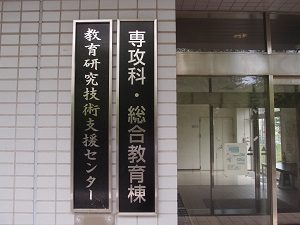Advanced Course
Advanced Course of Mechanical and Computer Systems Engineering
Advanced Course of Electrical and Electronic Engineering
Advanced Course of Chemical Science and Engineering

Message from the President of the Advanced Course
Our Advanced Course was established in 2003.
There are three courses, Mechanical and Computer Systems Engineering, Electrical and Electronic Engineering, and Chemical Science and Engineering. In each course, students have deepened their graduation research and presented the results in conferences worldwide.
As a result, the Advanced Course is now well known and has received high evaluations from companies and graduate schools.
Because the number of students is limited to 20, students are able to receive detailed support from the faculty. We are also working to enhance the education and research environment by actively connecting with neighboring universities and companies conducting cutting-edge research.
In the Advanced Course, we also focus on global education. Our first-year students all participate in a month-long internship during the summer vacation, and every year, around 10 students go abroad to Asia and Europe.
We are always happy to welcome Tokyo Kosen students or other high school students, or any adults who want to study again.
About the Advanced Course
Our Advanced Course consists of three courses, Mechanical and Computer Systems Engineering, Electrical and Electronic Engineering, and Chemical Science and Engineering.
The Mechanical and Computer Systems course is designed so that students can smoothly advance from the Department of Mechanical Engineering and the Department of Computer Science. Similarly, students from the Department of Electrical Engineering and the Department of Electronic Engineering can smoothly advance to the Advanced Course of Electrical and Electronic Engineering, and students from the Department of Chemical Science and Engineering can smoothly advance to the Advanced Course of Chemical Science and Engineering. But the courses are also designed for students from outside and adults.
To complete the course, students must earn the required number of credits (62 credits or more) and have a TOEIC score of 400 or more.
Since our Advanced Course is accredited by the National Institution for Academic Degrees and Quality Enhancement of Higher Education for the special application of awarding of bachelor’s degrees, students enrolled in our Basic Course can obtain a bachelor’s degree by application in the Advanced Course as long as they have earned enough credits. However, students from other schools or adults must pass an examination by the institution for a degree.
We also emphasize English education. In our English I and II courses, we set a goal of achieving a TOEIC score of 550 to students. In addition, as a special training, first-year students of the Advanced Course are required to participate in a one-month internship during the summer vacation and are encouraged to go not only to Japan but also to Asia and Europe. Furthermore, each Advanced Course student is assigned a research theme as a special research project, and they will not only present the results within the university, but also in academic conferences worldwide.
English Education in the Advanced Course
In the Advanced Course, we emphasize English education. This is because English skills are essential to cope with the internationalization of technology. In other words, the goal of our English education is to acquire English as a communication tool.
Classroom English is not enough to make it truly useful. It is necessary to raise the skill from “understanding English” to “using English.” To do this, the keys are practice and training. You need to digest English as a part of yourself through repeated training of your ears (listening), mouth (speaking), eyes (reading), and fingers (writing).
But it is also true that developing true English skills do not come overnight. You need continued daily training. In a theory, it is said that it takes 300 hours of training to become aware of improvements in one’s English ability. This means training in class is absolutely not enough and thus requires training on your own.
It is necessary to find ways to increase the amount of time interacting with English in your daily life.
That is why our English education focuses on practical training. We also monitor students’ self-training progress through our e-learning system. Through these actions, we are to provide effective English training for each individual. In addition, our English teachers and Advanced Course faculty cooperate in all aspects of English learning.
I urge you to keep these points in mind and study English with a strong mind to acquire truly useful English. All members of the Advanced Course will support you in every way.
Advanced Course of Mechanical and Computer Systems Engineering
This course teaches comprehensive knowledge and technologies related to mechanical information systems, which are based on mechanical engineering, information engineering, and their application technologies. In addition, students will develop practical development and application skills that enable them to propose and discuss “manufacturing” and “technology and theory.” The students will develop the skills necessary to strengthen themselves even after completing the course.
Advanced Course of Electrical and Electronic Engineering
This course teaches comprehensive knowledge and skills related to electrical and electronic systems, based on basic knowledge and skills in computer, communication, circuits and control, electronic materials and devices, and energy. At the same time, practical development and application skills for “manufacturing” are developed through experiments, exercises, and practical training. The students will develop the skills necessary to strengthen themselves even after completing the course.
Advanced Course of Chemical Science and Engineering
This course teaches knowledge and skills related to the development and manufacture of new materials, environmental purification and management, and the development and manufacture of bio-products, based on a chemical perspective of materials, the environment, and biology. Students will foster practical development and application skills that enable them to “make things.” The students will develop the skills necessary to actively absorb new knowledge and techniques even after completing the course.